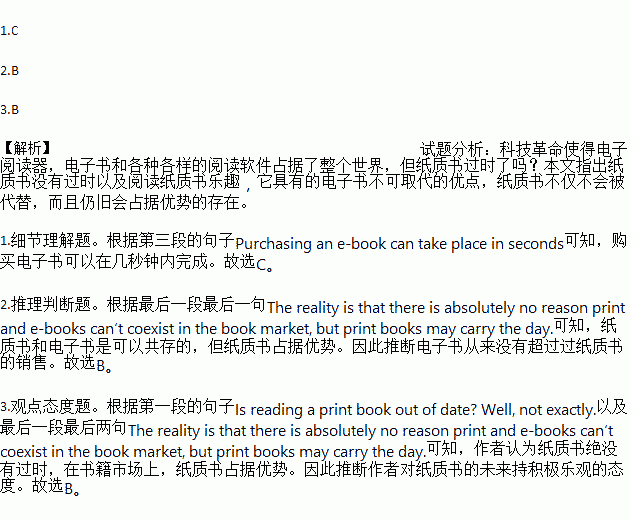题目内容
There has been a technological revolution where kindles, e-books, and various online reading apps have taken over the world. Is reading a print book out of date? Well, not exactly.
There are so many wonderful factors involved with reading a print copy of the book. I remember the excitement of going to the bookstore with my mom when I was in elementary school. The feel of sitting down in the book store and selecting the books I wanted to read was just so much fun! I think that reading paperback books has its own charm and excitement that cannot be replaced by an electronic book. Holding the physical copy of the book in my hands, and turning over each page makes the reading experience so much more real and memorable.
Admittedly, e-books seem to be more convenient than print books. Purchasing an e-book can take place in seconds and these books are often priced less expensively than print copy books. With e-books, there likely isn’t going to be a storage problem, unless the device has a limit on how many books can be purchased. Then again, in order to read e-books one must have a particular device-tablet, iPad, kindle or laptop to read it on. Thus, an additional payment has to be made in order to read e-books, whereas reading print copies does not involve any extra device.
Print books never actually stopped leading the charge, considering that e-book sales have never made up more than a third of all book sales. And although they rose to that number extremely quickly—Amazon, only introduced the kindle in 2007-the majority of all books sold has always been print. The reality is that there is absolutely no reason print and e-books can’t coexist in the book market, but print books may carry the day.
1.What advantage do e-books have according to the passage?
A. The reading experience is more real.
B. There is no storage problem at all.
C. Purchasing them takes less time.
D. They are very priceless.
2.What can we infer about the book market?
A. E-book sales make up more than 1/3 of all book sales.
B. E-book sales have never surpassed print book sales.
C. Amazon occupies most of the market.
D. Print books and e-books can’t coexist.
3.What’s the author’s attitude towards the future of print books?
A. Worried. B. Optimistic.
C. Indifferent. D. Doubtful.

